One of the Polyphonic Caravan’s most important fruits is the progressive formation of an informal but living Community of Polyphony including more and more of the persons that sing, research and love the polyphonic song in Greece, always keeping the bridges with all those participating in the Polyphonic Caravan’s actions coming from neighboring polyphonies and other countries. The persons and collectivities constituting the Community organize their meetings, collaborations and common actions, as well as inform each other on the independent actions of each polyphony core and support each other for their promotion and success. The attempt to write down the polyphonic groups that have diachronically participated in the Polyphonic Caravan constitutes a small contribution to the mutual support of the existent polyphony cores. This writing down begins from the groups that have participated during the first years, most of which either do not exist anymore or have changed their composition. The list will continue to be gradually completed with all groups, especially those that hold the torch of the polyphonic song nowadays.
GREEK-SPEAKING:
- POLYPHONIC GROUP OF KTISMATA
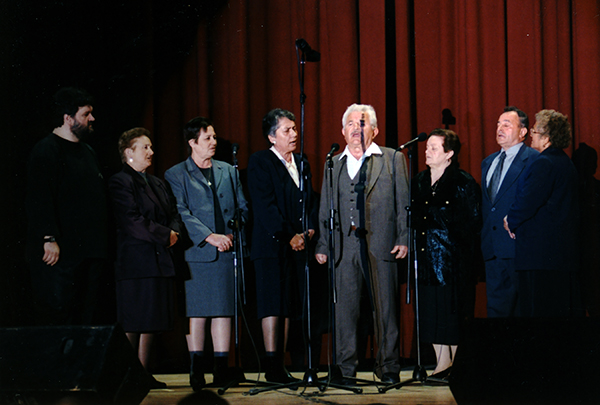
A group with significant appearance in Greece and broad, either as Polyphonic of Ktismata or Polyphonic of Epirus. A pioneer at promoting Epirotic polyphony. It recorded in France, in 1984, the album “Chants Polyphoniques et Musique d’ Epire”, curated by Aris Fakinos and Domna Samiou. In 1995 the group’s second album “The Polyphonic Song of Epirus” was released. It participated in the 1st Big Polyphonic Song Concert, as well as in the collective cd “POLYPHONIC SONGS / LIVE RECORDING AT PALLAS THEATER” with three songs. Two of the group’s leading figures, Sokratis Tsiavos and Anthoula Kotsou, have passed away recently. They do not sing as a group anymore.
Its composition in 2000: Sokratis Tsiavos, Sofia Demiri, Anthoula Kotsou, Dimitris Matsias, Giorgos Papas, Dimitroula Tsiavou, Vaggelis Kotsou
- PARAKALAMOS GROUP
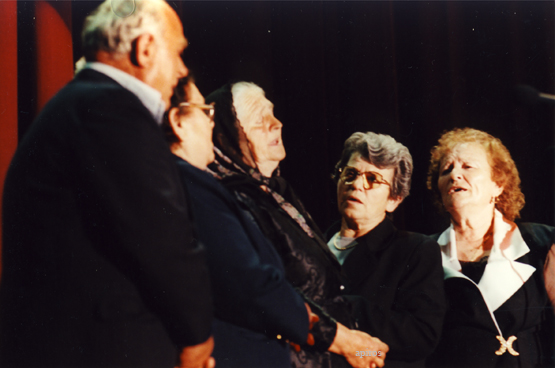
A polyphonic group from the homonym large village of Ioannina Prefecture, characterized for its outstanding, particular tradition in the polyphonic song. It was shaped as a group in 1999 on the occasion of the organization of the 1st International Polyphonic Song Meeting, revitalizing the song in a village where it had stopped being heard since long time ago. A group from Parakalamos had participated in the record “EPIROTIC MUSIC TRADITION” (a publication by the Cultural Centre of the Municipality of Ioannina in 1994, curated by Lampros Liavas and Vassilis Nitsiakos). Songs interpreted by them were included in the first three cds of “Apiros”. The group of Parakalamos does not sing since years now, especially after 2010, when Frosso Charissi passed away. However, an effort of revival of the song takes place.
Participants: Efrossini Charissi, Alexis Tsianos, Stamatia Chaskou, Katerina Chaskou, Dimitris Chaskos, Alexandra Skaroni, Stavros Virvilis, Christos Gkogkos
- GROUP OF ANO DEROPOLI
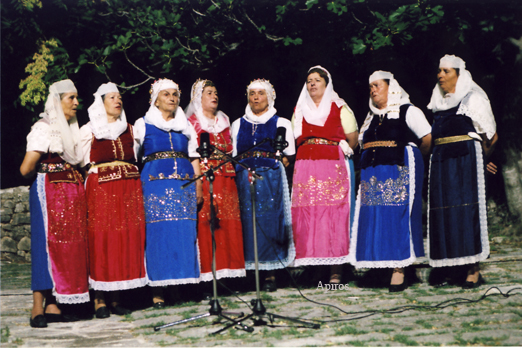
A group composed of villagers from Sotira, Kossovitsa, Selleio and Loggos of Ano Deropoli in Northern Epirus. The group has appeared, having different compositions, at the first International Polyphonic Song Meetings. Later on, a female polyphonic group from the same region, known as “Kirades of Ano Deropoli”, participated as well. A group from Sotira village had also participated in the album of the Northern-epirotic Researches Foundation “POLYPHONIC SONGS OF NORTHERN EPIRUS”.
Participants: Elpiniki Gkogka, Pinelopi Gkogka, Afroditi Ntralio, Melpomeni Loli, Panagiotis Mparkas, Vaggelis Gkogkas, Anastasis Markos.
- POLYPHONIC GROUP OF DERVITSANI
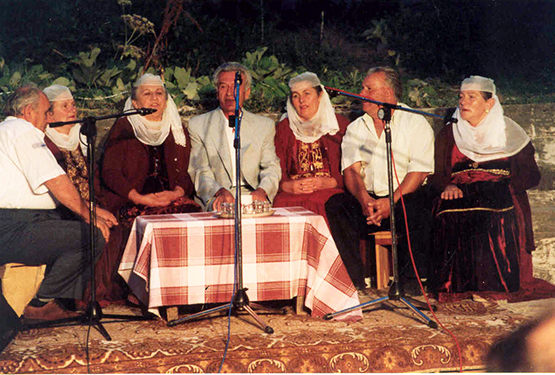
A group that comprises mainly of members of Dedes family coming from the largest Northern-epirotic village of Deropoli. The group has repeatedly been recorded in Greece, participating in the albums “EPIRUS” of the “Greek Frontiersmen” series, “I HEAR THE WIND BLOWING” and “GREEK CHRISTMAS CAROLS” of the Greek Music Archive. They have appeared in numerous International Polyphonic Song Meetings and Polyphonic Caravans. During the last years, Dervitsani is represented by two younger polyphonic groups, that of adults and its young polyphonic group.
The older composition: Dimos Dedes, Giannis Dedes, Vasiliki Dede, Dimitris Tsamis, Vasilo Kiriakou, Persefoni Sirmou, Lefkothea Mparouta, Nikos Mparoutas.
- POLYPHONIC GROUP OF CHIMARRA
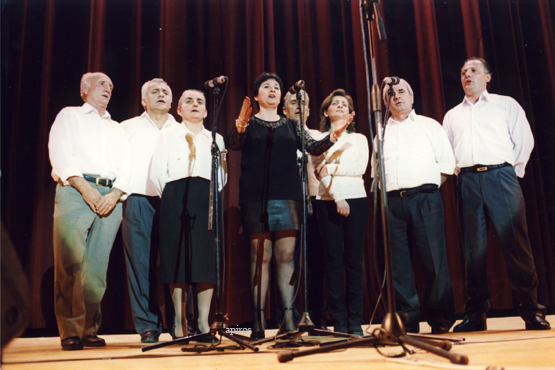
The group consists of Chimarra residents as well as migrants from Drimades village (to the east of Chimarra) currently living in Athens. The group appeared in 1993 at Athens Concert Hall and in 1997 in Amsterdam. The polyphony of Chimarra is characterized by its evolved melodic expression. Polyphonic groups from Chimarra had participated in the records “POLYPHONIC SONGS OF NORTHERN EPIRUS” (Northern-epirotic Studies Foundation, 1996, curated by M. Zotos, K. Lolis and P. Tziokas) and “EPIRUS” of the “Greeks Frontiersmen” series (FM Records, 1999, curated by G. Konstantzos). The group has co-traveled along with the Polyphonic Caravan for many years.
Members: Katerina Mpelieri, Foteini Netsou, Vasilis Oikonomou, Elli Netsou, Christos Varfis, Nikiforos Konomis, Dimitris Netsos, Vironas Dimogiannis
- POLYPHONIC GROUP OF POLYTSANI
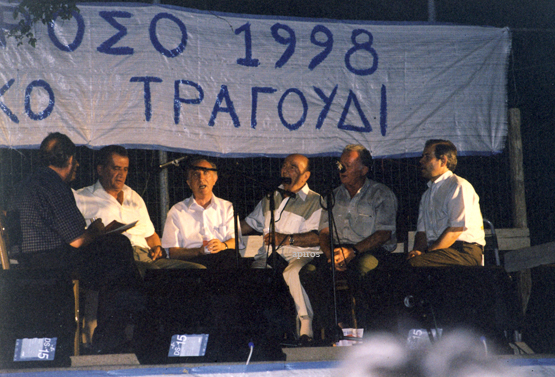
A group consisting of singers from Polytsani village currently living in Ioannina. They come from the homonymous village of Ano Pogoni in Northern Epirus, characterized by its significant polyphonic tradition. A group from Polytsani participated with seven songs at the “POLYPHONIC SONGS OF NORTHERN EPIRUS” record made by the Northern-epirotic Studies Foundation, curated by Menelaos Zotos, teacher from Polytsani. The group participated at the very first event organized by “Apiros” in 1998 in Polydroso village as well as during the first years of the International Polyphonic Song Meetings. Later, Politsani is being represented by other groups, either mixed or purely male and female.
- CHAONIA
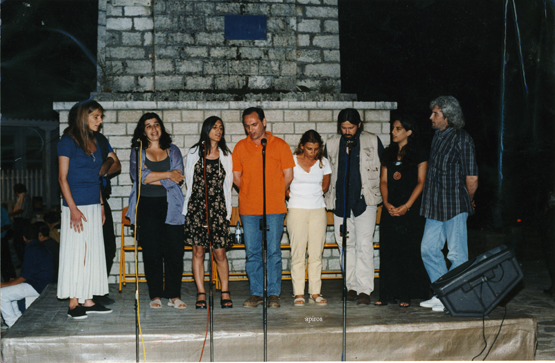
It was created in 1996 by some of the then students at the polyphonic song seminars of the Museum of Folk Musical Instruments. The group is named after the land of Chaones, the oldest of the 14 Epirotic tribes. The area of ancient Chaonia overlaps with the place where Epirotic polyphony is revived nowadays. In 1998, Chaonia was awarded by the Panepirotic Confederation of Greece for its contribution to the promotion of the polyphonic song. Today, it constitutes the most long-lasting active group and has appeared in a series of countries (Germany, France, Italy, Wales, Albania, Bulgaria). Its members are diachronically the pioneers of the Polyphonic Caravan.
- POLYPHONO
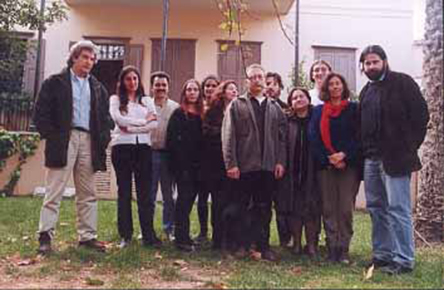
A group of the Polyphony Workshop which functions in the framework of “Fivos Anogianakis” Museum of Greek Folk Musical Instruments -Center of Ethnomusicology. It is consisted of students of the polyphonic song seminars annually organized by the Museum. It has appeared in concerts in Epirus, Patra, Grevena, Fragkokastello and elsewhere. Alexandros Lampridis, along with Antonis Exarchos, Maria Tsoukala and Aliki Gkana, has been responsible throughout the years for the seminars.
- “INORO” POLYPHONIC GROUP
Polyphonic group of the Municipal Music School of Ioannina. It was created in autumn 2001, it functions under the supervision of musicologist Kostas Lolis and consists of young musicians and singers, students and teachers of the Music School. In 2002 “Inoro” appeared in concert for the first time at the Castle of Ioannina. During the last years the group has recorded two cds and has been awarded for its performance in an Albanian Festival.
- GROUP OF LOUPSIKO
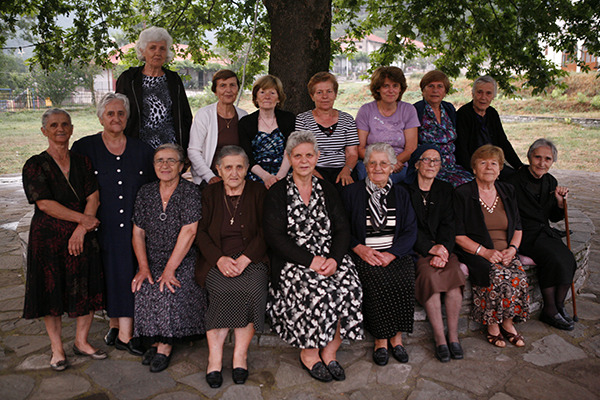
A female vocal group from Kefalochori village of Ioannina, the subsequent place of residency for Loupsiko villagers. Its singing is of collective character and has been discographically recorded by “DORA STRATOU” Greek Dances Theater, curated by Agoro Tsiou and Alkis Raftis (“LOUPSIKO OF KONITSA, SONGS AND DANCES OF MARRIAGE”).
- POLYPHONIC GROUP OF MOURGANA
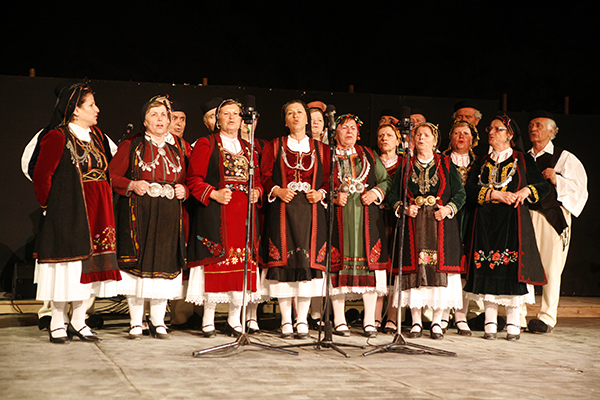
The singing group of the dance club of Mourgana Federation. It consists of emigrants coming from Mourgana villages currently living in Athens. In 2002 it released the album “SINGING IN THE LAND OF PYRROS”. Giorgos Stergiou was then responsible for the group. The group diachronically participates in almost all Big Polyphonic Song Celebrations.
-ASTERIA
The group was founded in 1993 following the initiative of Giorgio Vinzenzo Filieri, descendant of a folk singers family. The intense rhythm of pizzica-pizzica and the ancient Greek dialect spoken in Sternatia and the Greek-speaking region of Salento, have become the principal symbols for Asteria. The group has participated in significant cultural events and has given concerts in Greece and Albania. In spring 2002 it participated in the 3rd Big Polyphonic Song Concert. Beyond a music group, Asteria is also a cultural association aiming for supporting and preserving the traditions of the Greek-speaking villages. It collaborates with the “Observatory for Diaspora, Cultures and Overseas Countries Foundations” of the University of Lecce and the Philology Department of the University of Ioannina.
VLACH-SPEAKING:
-POLYPHONIC GROUP OF KEFALOVRYSO
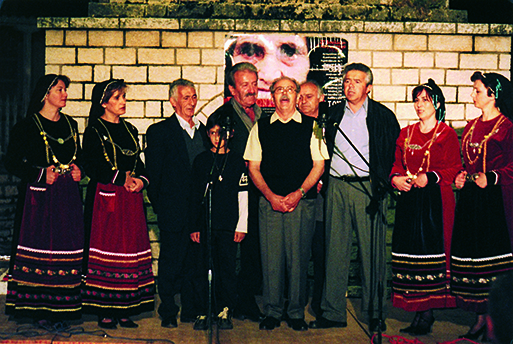
Vlach-speaking polyphonic group from Mitzintei, Kefalovryso of the Prefecture of Ioannina. In a village with an outstanding music tradition, the group, having been recreated in summer 2001, contains three different generations of singers. It appeared in the 3rd International Polyphonic Song Meeting and in the 3rd Big Polyphonic Song Concert at Petra Theatre as well as the years that followed. Some of its leading members have passed away.
Participants: Mpampis Mentis, Evaggelos Gkermotsis, Gerasimos Foukis, Lazaros Sideris, Dimitris Foukis, Eleftherios Potsis, Achilleas Grammozis, Spyridon Foukis, Spyros Nitas.
-GROUP OF AETOMILITSA
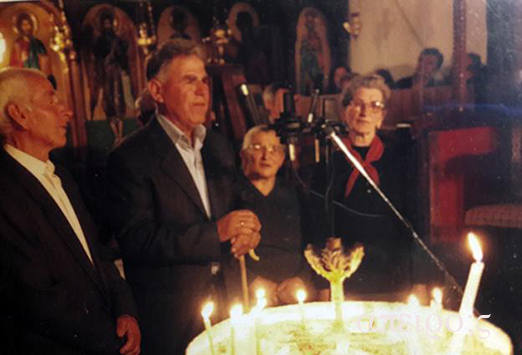
Vlach-speaking group from Ntenitsko, Aetomilitsa, village at the more distant Northern-eastern part of the Prefecture of Ioannina, at the mountainsides of Grammos. Their song is collective, influenced by the Grammoustian polyphony and its interpreters of the old generation of the song are now only a few. The group had been recreated on the occasion of the 3rd International Polyphonic Song Meeting in summer 2001.
-ANDON POCI
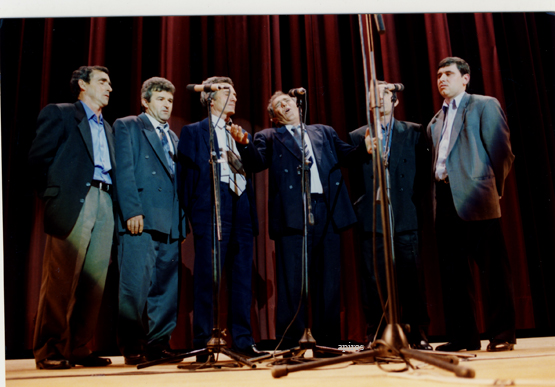
Vlach-speaking polyphonic group coming from the homonym village of Gjirokaster region. It was created in 1973 and has been awarded in various folkloric festivals. It has been recorded at the radio stations of Gjirokaster and Tirana. Its first appearance in Greece took place in 1996 in Veroia. It participated in the 1st and 2nd International Polyphonic Song Meetings as well as in Pallas Concert of 2000.
Participants: Vasil Basho, Kristo Basho, Haralampos Mexi, Leonidas Mexi, Lefter Puja, Gjergji Gorica
-IEROPIGI
Vlach-speaking polyphonic group from the Vlach borderline village of the Prefecture of Kastoria. Young people from the village fighting for the preservation of their cultural heritage are also included in its composition.
-KRANIA
Vocal group from the Vlach large village of the Prefecture of Grevena. In 2002 it released the digital disc “TOURGIA KRANIA” under the leading role of the village’s priest.
-PLATARIA
Tzimas family members from Plataria are most probably the last interpreters of Vlach-speaking polyphony in the area of Thesprotia.
ALBANIAN-SPEAKING:
-GJIROKASTER’S YOUNG PEOPLE (NEOI OF GJIROKASTER)
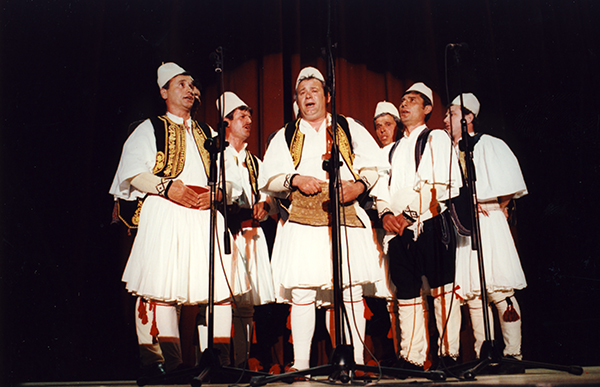
One of the most important interpreters group of the Albanian Lab polyphonic song. It was founded in 1978 by young people with the aim of giving a new life in this oldest genre. They have appeared as a group in numerous concerts in Albania and abroad (France, Switzerland, Italy). In 1995 their album “POLYPHONIES VOCALES DU PAYS LAB” (INEDIT) was released. In Greece they appeared in the 1st and 2nd International Polyphonic Song Meetings as well as at Pallas Theater in 2000.
Participants: Arian Shehu, Thoma Kolie, Idriz Isaraj, Banush Malo, Koco Vasili, Mercin Haska, Perlat Meli
-PREMETI
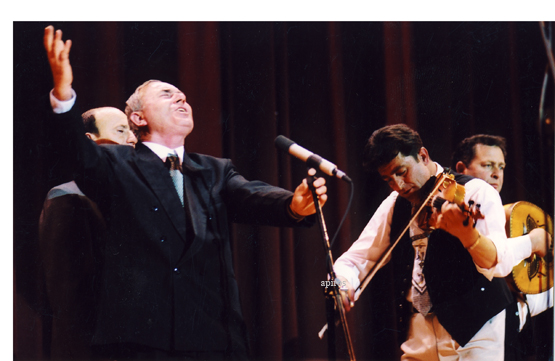
One of the most popular interpreters group of the Albanian Tosk polyphonic song. The group started its course in 1990 in the context of the cultural association “Elena Gjika”, having as goal the cultivation of the Tosk polyphony a capella as well as accompanied by instruments. It appeared in various countries and participated in all first three International Polyphonic Song Meetings in borderline Epirus.
Participants: Basil Curi, Dhimitraq Curi, Jarek Muco, Suleiman Lame, Erehrd Muco
SERBIA:
-MOBA (= the voluntary offer of work among neighbors following the completion of agricultural works)
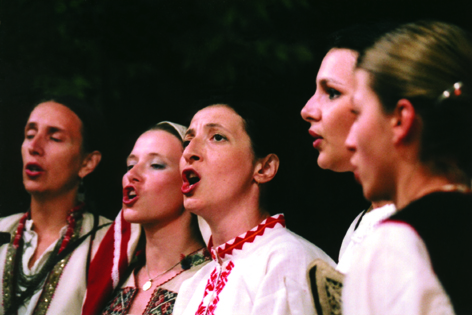
Female polyphonic group from Jugoslavija. It was created in 1993 ans consists of seven young women, among which three ethnomusicologists and two ethnologists. It interprets folk songs, while it uses the personal filed-based recordings made by the group’s members in order to justify the interpretation. It has appeared in Serbia, FYROM, France. Its first appearance in Greece took place in Thessaloniki in 1995. Two cassettes with their work were released in Belgrade in 1994 and 1996, with Serbian songs of different vocal genres.
Participants: Zvezdana Ostojic, Dragana Jovic, Jelena Jovanovic, Aleksandra Pavicevic, Jelena Martinovic, Jelena Glavas
BULGARIA:
-VAY DOUDOULEY
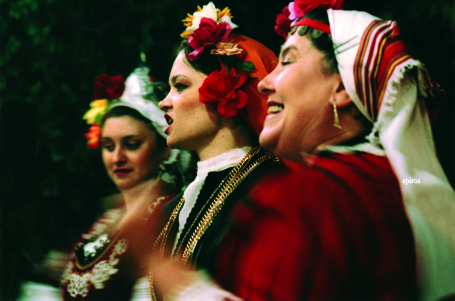
Female vocal group consisting of four women with an origin from Plovdiv region, mainly from Markovo village. The group has appeared in several countries and has repeatedly been recorded. Its interpretations are based either on the purely vocal tradition, the instrumental accompaniment or the improvisation in the context of collaborations with jazz music groups.
Participants: Djiana Georgieva Nikolova, Vichka Atanasova Nikolova, Hristina Stoilova Lesava, Lili Kirilova Nedyalkova
Period 2006-2020, active polyphonic groups
Τhroughout the last decade, Polyphonic Caravan has welcomed in its events and actions a series of new polyphonic groups and co-travellers. Many of these groups are the fruit of Polyphonic Caravan's contribution to the transmition of polyphonic song across Greece. For the time being, following you may find pictures of these groups; more information on them are going to be added soon. The plethora and variety of polyphonic groups show the vividness and "spring" of polyphony in Greece, and this is one of the biggest vindications of Polyphonic Caravan's work.
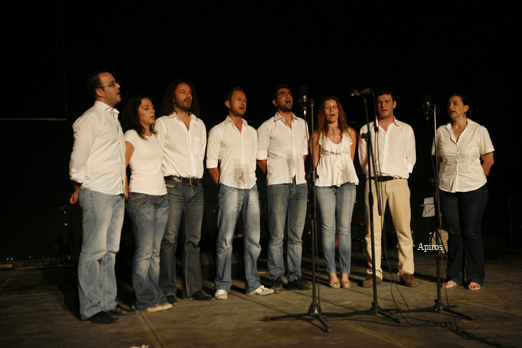
AETOPETRA polyphonic group
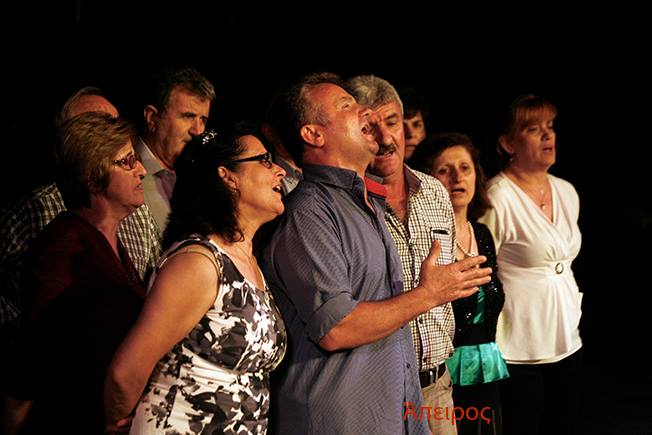
"ANO POGONI" (Polytsani, Sopiki) polyphonic group
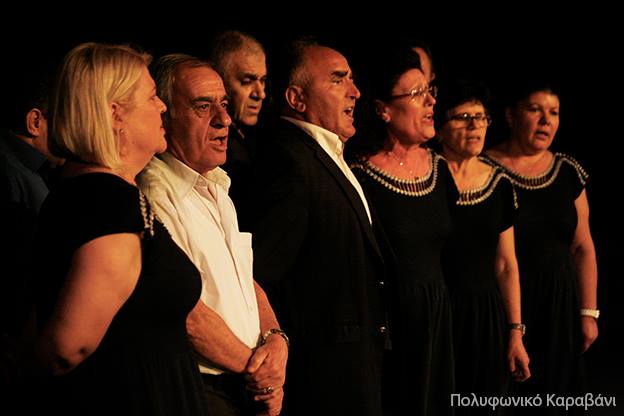
"DELVINIOTIKA" polyphonic group
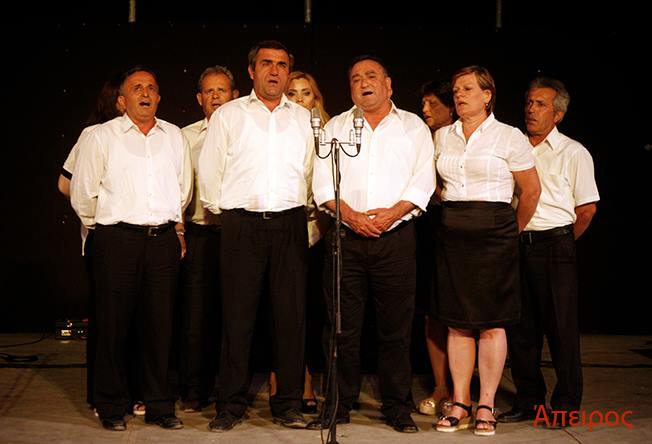
"CHAONES" North Epirus Folk Association's polyphonic group
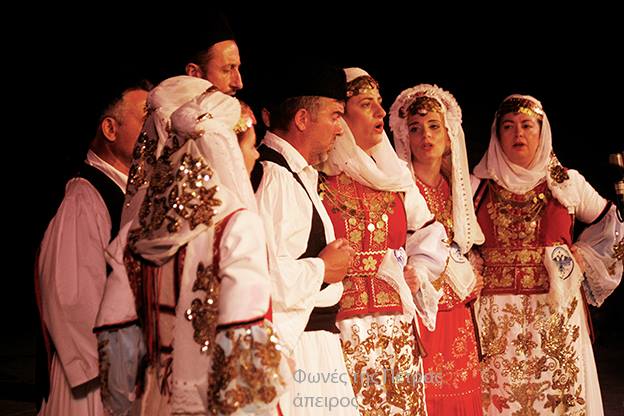
"DEROPOLI" Dancing Culture Association's polyphonic group
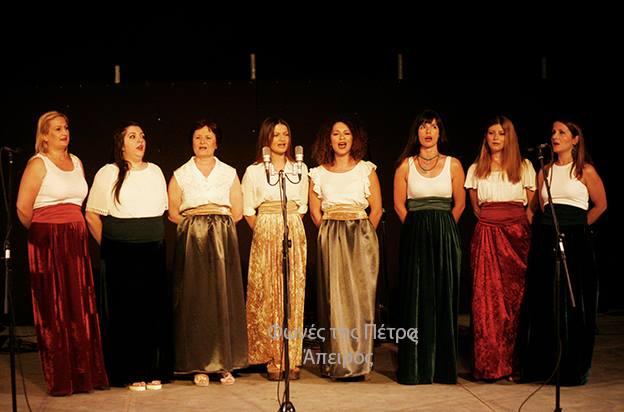
"ISOKRATISSES" polyphonic group
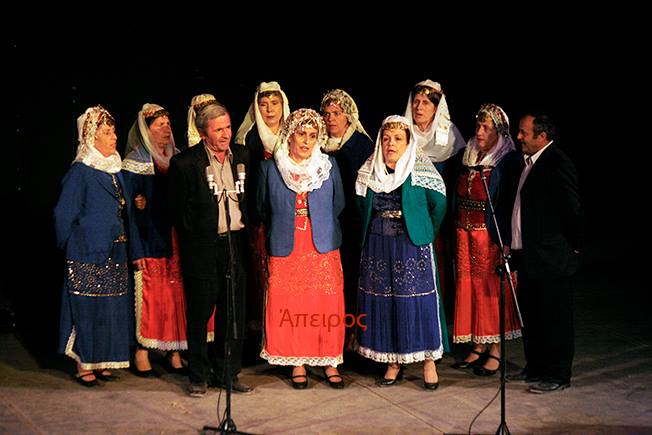
KOSSOVITSA polyphonic group
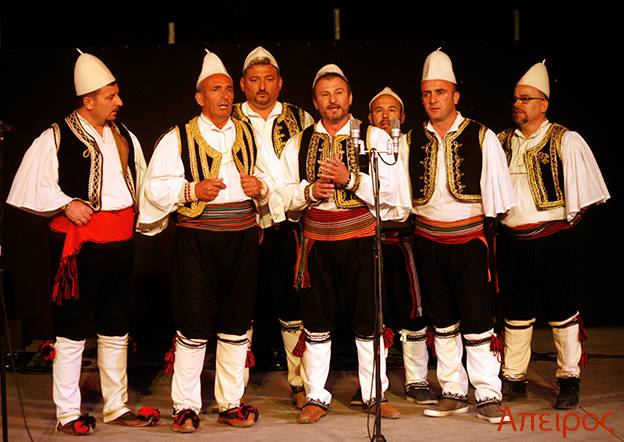
"LOT KURBETI" (albanian) polyphonic group
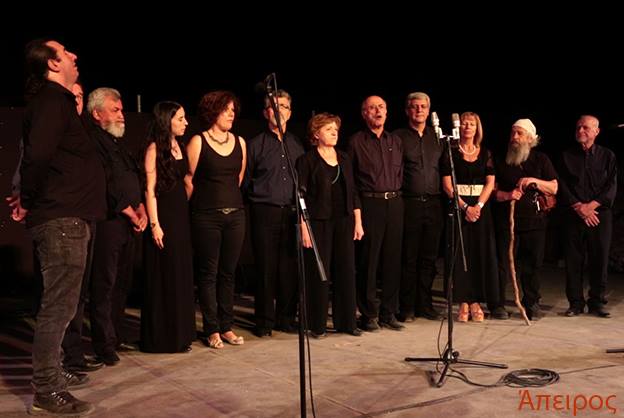
"PANEPIROTIC" polyphonic ensemble
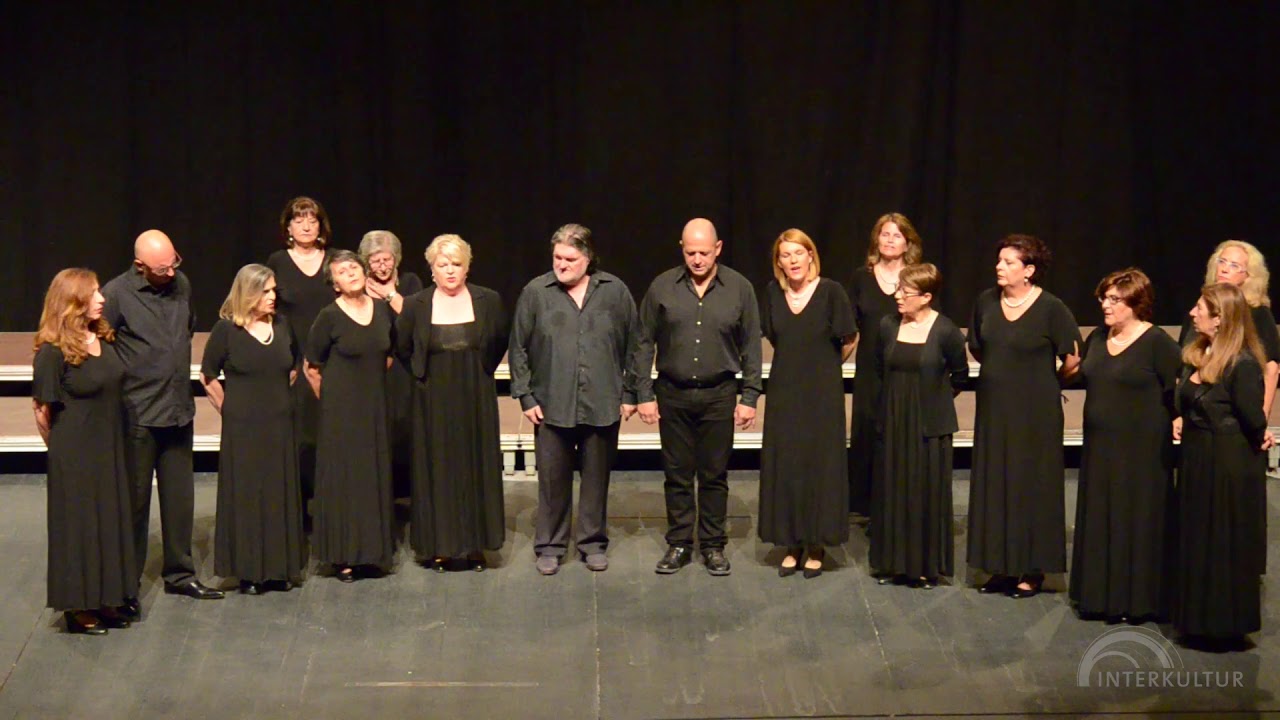
"PENTATONO" polyphonic group
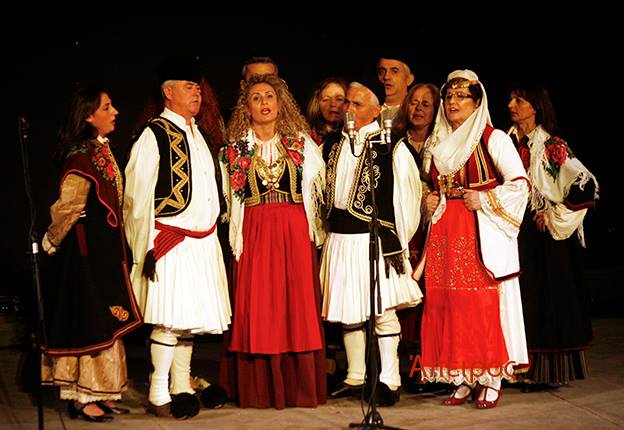
VOUTROTO CULTURAL UNION's polyphonic group
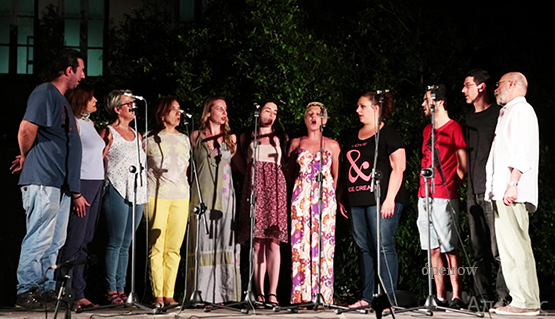
"POLYPHONO" polyphonic ensemble
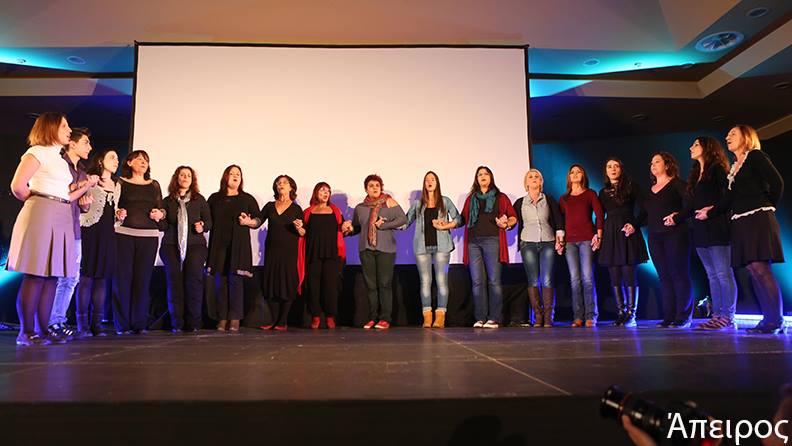
PYRGOS polyphony workshop ensemble
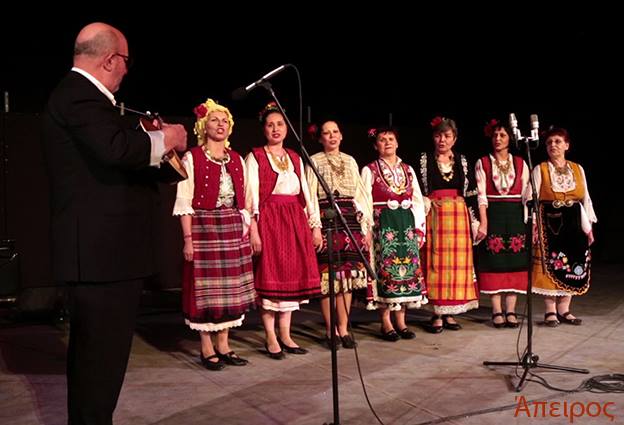
"RODINA" (Bulgarian) polyphonic group
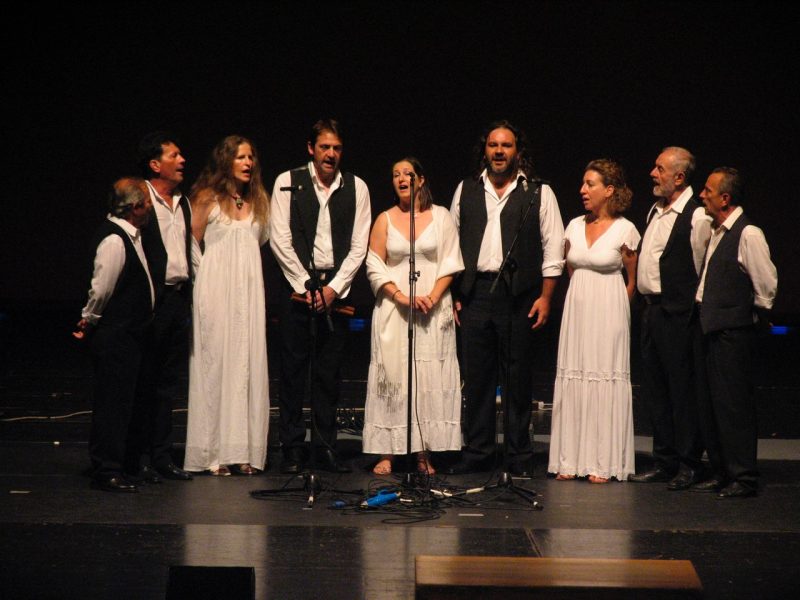
"INORO" polyphonic group
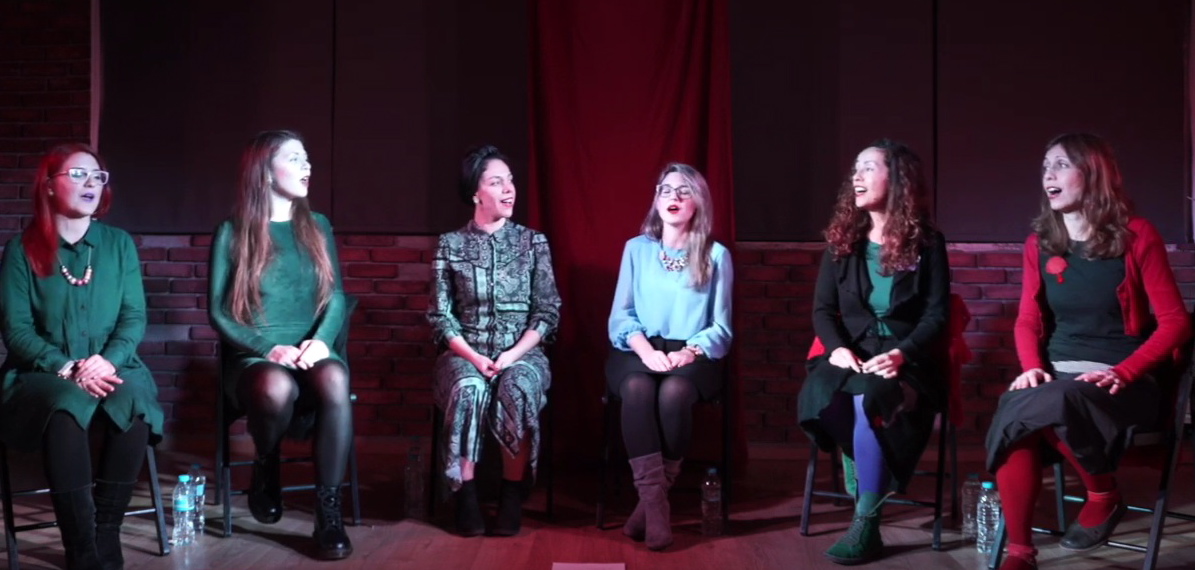
"DIONI" polyphonic group
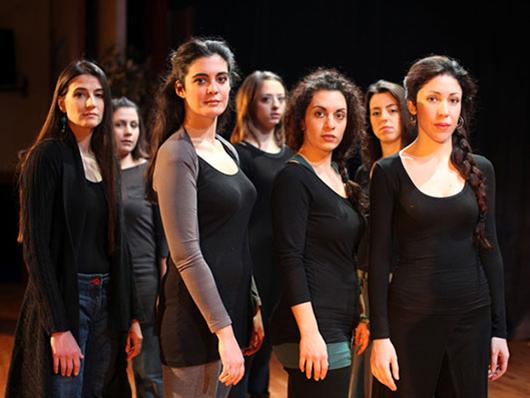
"PLEIADES" polyphonic group
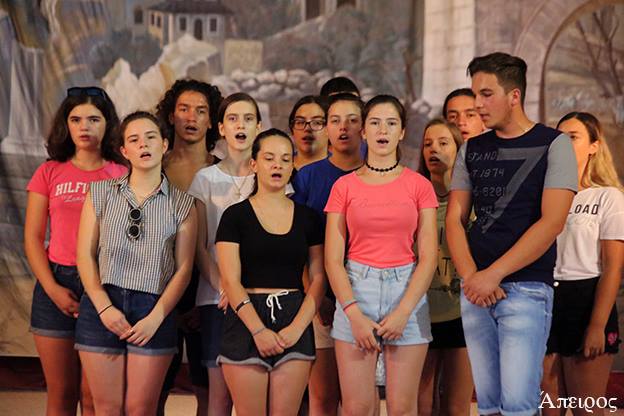
"DERVITSANI" youth polyphonic group
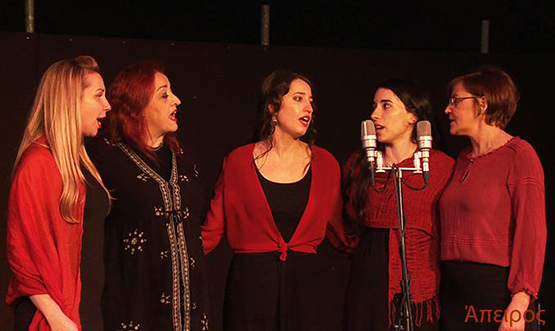
"IO" (Volakas, Corfu, South Italy polyphonies)
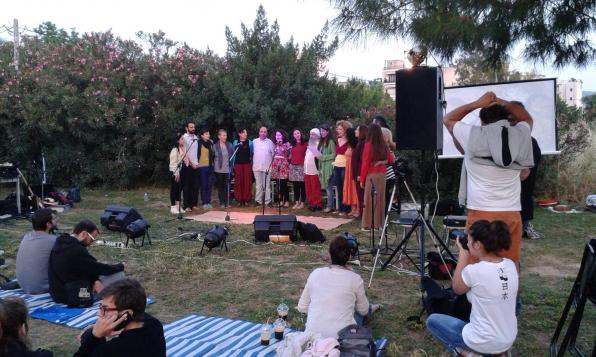
"AKADIMIA PLATONOS" "polyphonic coffee shop"
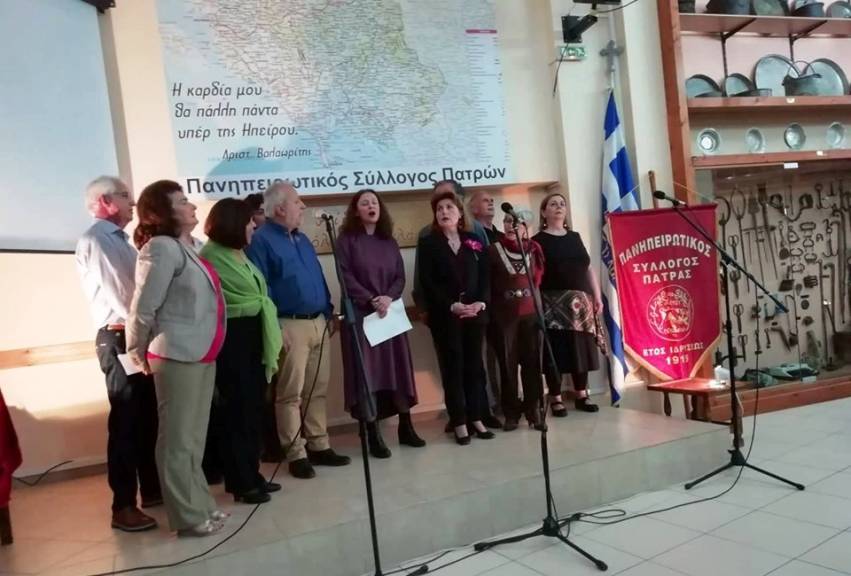
PATRA'S PANEPIROTIC ASSOCIATION's polyphonic group
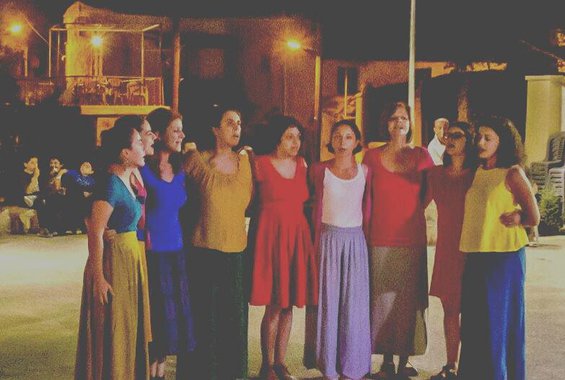
"EIDEKANOU" polyphonic group - Cyprus
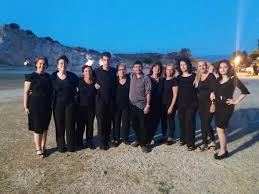
EPIROTS ZOGRAFOU ASSOCIATION's polyphonic group


